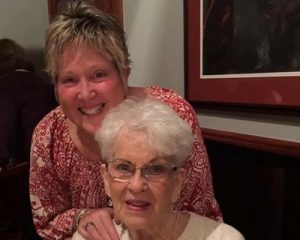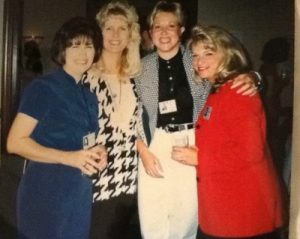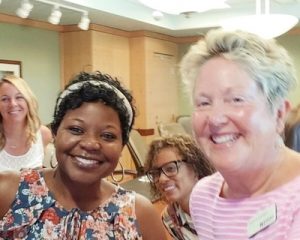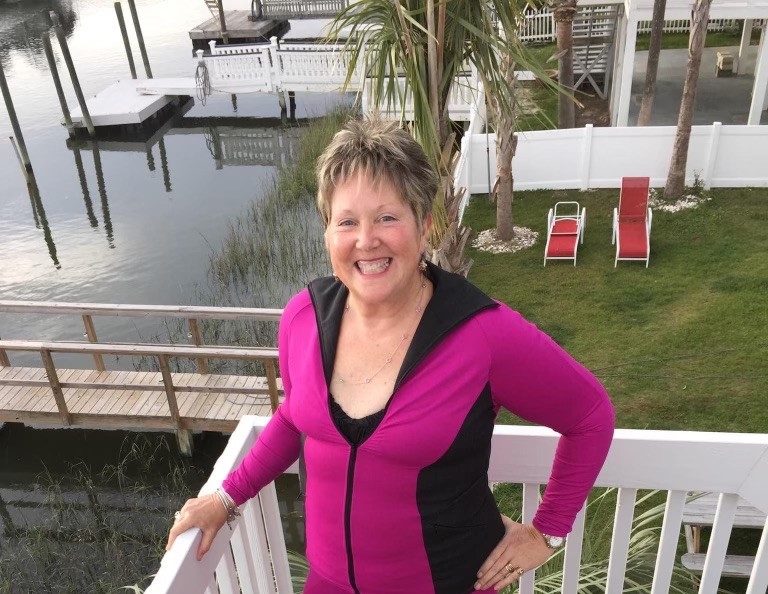By Patrick Flanary, Novant Health Healthy Headlines
To find and book a physician click here.
When doctors diagnosed the lump in Gretchen Bergen’s breast as cancerous, in 2017, she knew who to call.
Her cousin, Kimmie Durham, had been advocating for cancer survivors for 20 years. She was diagnosed in 1997 with invasive ductal carcinoma, the most common breast cancer and the type Bergen needed removed. Durham was not only family; she was also the chair of the Novant Health Brunswick Medical Center Foundation board of directors.
“Kimmie was one of the first people I told,” Bergen, who was 67 when she was diagnosed, said from her home in Michigan. “She did not want me to go through my experience alone.”
Sure enough, that May, Durham got into the Ford Expedition she called Big Red and headed north. Two days and 1,000 miles later, she was at her cousin’s side, asking doctors the questions Bergen hadn’t considered asking herself.
“Your emotions are sky-high; you just can’t think of everything,” Bergen said. “Kimmie was grounded. And it made me feel so secure and safe that she was with me.”
Think of it as strength-in-numbers advocacy. Or, as Durham likes to put it, “Four ears are better than two. I think you should always take someone with you. You might not ask the right questions, or you might be overwhelmed by the information.”
Sound familiar? How often have you either misunderstood or forgotten what your doctor said during a routine medical visit? With the stakes much higher around a cancer diagnosis, patients might invite a survivor ally—equal parts consultant, coach, and cheerleader—who can help absorb and carry that burden. The advocate is there to do the asking and the listening. As Bergen put it: “Kimmie had my back.”
A 25-year journey
In late August, Durham commemorated her 25th year of surviving breast cancer. She is a third-generation survivor and was diagnosed at a younger age than were her Granny (67) and Mama (52).
Durham was 38 and training for a marathon, running up to 100 miles a week, when she found a lump. Given her family history, Durham said, “I already knew that it was cancer.”
Doctors removed a golf ball-sized tumor from her breast, as she wrote in a 2020 essay. She was told that, had the lump been any bigger, a mastectomy would have been necessary—a procedure that both Durham’s Granny and Mama had experienced.
“Granny handled her breast cancer like a champ, and it shaped my life from the very beginning,” Durham said. “She never used a prosthesis; she just stuck Kleenexes in there. I saw that the breast doesn’t make the woman.”
When Durham was diagnosed with stage 2 cancer, her mother gave her “Dr. Susan Love’s Breast Book.” Durham became well acquainted with the acclaimed guide over the next year, during radiation and chemotherapy treatment.

Kimmie and Mama.
Durham’s mother is 95 and in her 44th year of survivorship. The book she gave her daughter is a gift that keeps giving today. Since her diagnosis, Durham has handed out 357 copies of what she calls “the Bible of breast care,” she said.
Durham often bears gifts. Part of her advocacy and outreach involves working with survivor groups to put together Comfort Care bags for those who are diagnosed. Those include caps, fingerless gloves, and motivational “Chicken Soup for the Soul” books. In 2000 Durham founded Third Generation by Design, an organization urging screenings for early cancer detection. “If you have breasts, you’re at risk,” she said. That includes men.
For years Durham made it her business to wear pink every day. When someone at the grocery store would stop her to ask why, she had her reply ready: “Have you had your mammogram?”
For Durham, this is how advocacy was born: through a conversation, and a friendly, firm nudge toward getting screened for breast, cervical, and prostate cancers.
The COVID challenge
Durham’s mission and plea took on greater urgency in early 2020 when the COVID-19 pandemic upended people’s routine screenings. Many people put off non-emergency visits and checkups with social distancing directives in place and understandable fears of getting infected in places like waiting rooms.

Kimmie Durham (second from right) attending her 20th high school reunion, one week after her lumpectomy, 1997.
Durham worked the phone, calling and reassuring as many women and men as she could that they were still safe to book appointments and visit their doctors for screenings. “Even though we’re in a war against COVID right now,” Durham told them, “you still need to be getting your mammogram and Pap test.”
COVID also forced Durham’s community outreach to shift from in-person church fellowship to prayer chains on Facebook. There, Durham is able to offer people a ride to an appointment. Social media offers the ease of interacting and checking in with more people. And it’s often where patients find her and her work.
“If you lacked access to begin with, then during COVID the doors were slammed shut,” Durham said. “I’m a strong believer in God. So many of these referrals are God-given.” This was how Durham was put in touch with Sharonda Davis.
A long road
Davis is one of Elloise Hankins’s 14 children. Family and faith defined Hankins, who had a graceful smile and loved the music of Al Green. She was always so happy and healthy that her kids called her Superwoman. They’d never seen her sick.
That changed dramatically when doctors at Novant Health Brunswick Medical Center diagnosed Hankins with the rare and aggressive inflammatory breast cancer, at age 77.
“To watch her weight drop drastically and lose her hair, it took a toll,” said Davis, who became her mom’s primary caregiver in the small coastal town of Bolivia in 2016.

Sharonda Davis and Kimmie Durham.
Durham offered help early on by driving Davis and her mother to Duke University Hospital—three hours away. During that meeting, Durham helped ensure that the Duke physicians worked with Hankins’s doctors back home. This way, those long, stressful drives for treatment were eliminated. Instead, the Duke doctors shared trial therapies with those in Bolivia, who treated Hankins until she died in 2019.
“God took care of her those three years,” Davis said. “It just so happened cancer was the vehicle that got her from Earth to glory.”
Meeting Durham was a blessing, Davis said. “She was very instrumental in helping ease our distress from my mom’s diagnosis. She was always there to talk, encourage, pray.”
Durham served six years as chair of the Novant Health Brunswick Medical Center Foundation board of directors, until earlier this year. (She handed the baton to Lannin Braddock and remains on the board.) Durham said she’s fully dedicated to advocating and fundraising until scientists find what she calls “the elusive cure.”
“We’ve got to continue to communicate the importance of advocating for yourself,” Durham said. “Because no one is going to care for your health more than you are. And you’ve got to ask questions.”
Top photo: Kimmie Durham at her home in Ocean Isle Beach.
Novant Health
Healthy Headlines
Facebook
Instagram
Twitter
YouTube




